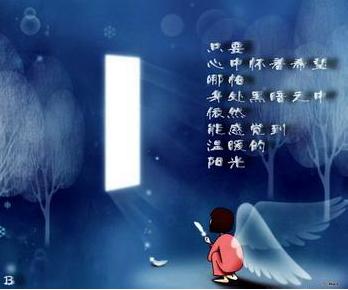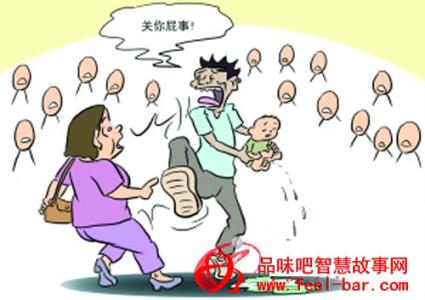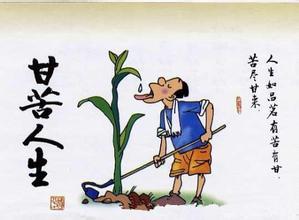有不少同学都是通过多看一些简单点的英文励志故事来学习英语的,那么简单点的英文励志故事都有哪些呢?一起来看看吧。
简单点的英文励志故事:小约翰
One day, Robin Hood went hunting alone in the forest. He had told his men that if he should fall into any danger and could not escape he would blow his horn so that they might know and come to help him. When he was crossing a river by a long bridge he met a huge man at the middle. And neither of the two would give way to the other. Robin Hood got angry and put an arrow to his bow and made ready to shoot. The stranger said it was unfair for Robin Hood to shoot a man who had only a staff in his hand. Hearing this Robin Hood lay down his bow and pulled up a small tree and returned to the stranger.
They agreed to fight on the bridge, and that the one who first fell in the stream would be the loser. Robin Hood first struck the stranger a blow, but the stranger did not fall. Then the stranger gave him such a hit on the head that blood flowed. This made him so angry that he attacked the stranger violently as if he wanted to kill him. But then he received another blow and fell into the river. The stranger laughed loudly. Robin Hood swam to the bank, pulled out his horn and blew it so that the valley echoed with the sound. At this fifty men came out of the wood, all in green, and they asked Robin what had happened. Robin said the stranger had caused him to fall into the water. When his men were going to seize the stranger to duck him as well, Robin Hood stopped them. He praised the stranger for his strength and courage, and asked him what his name was and if he would be one of his men, living a merry life in the forest. The stranger said his name was John Little, and he was very glad to join them and to be true to Robin Hood.
But the merry men preferred to call the stranger Little John. Of course it was only a joke, because he was actually seven feet high and more than three round at his waist. Little John later became the leader of the band just below Robin Hood.
有一天,罗宾汉独自到林子里去打猎。他跟手下人说好,一旦他遇到危险无法脱身,他就吹号招呼他们前来救助。他从一条长长的窄桥上过河时,在桥的正中遇到一个大个子。两人都不肯给对方让路。罗宾汉发起火来,把箭搭在弓上,瞄准对方。那陌生人说,罗宾汉向手里只有一根棍子的人射箭,未免有欠公平。于是罗宾汉放下弓箭,拔了一棵小树回来。
两人说定,就在桥上一比高低,先掉进河里的就得认输。罗宾汉先打中那人一棍,但那人身躯庞大,只晃了晃,没掉下去。陌生人接着一棍子打在罗宾汉的头上,打得头破血流。这下可惹恼了罗宾汉。他发起狠来,恨不得结果那人的性命。但他急中生错,让对方看出破绽,一棍子把他打落在水里。陌生人哈哈大笑。罗宾汉游上岸,吹起号角来。号角声在山谷里回荡。霎时间,从林子里冒出50个身穿绿衣的汉子,问罗宾汉为何事召唤他们。罗宾汉说明原因,汉子们就要动手把那人按进水里,但罗宾汉阻止了他们。他夸奖陌生人的力量和勇气,问他是否愿意入伙,在森林里过快活日子。陌生人自称名叫约翰•利特尔,很愿意入伙为罗宾汉效力。
但罗宾汉一伙把他的姓和名颠倒过来,改成了小约翰。这当然是开玩笑,因为小约翰是个大个子,身高七英尺,腰围有三英尺多。后来小约翰成了罗宾汉的副手。
题外话:中国人提起神箭手,总能想起楚国的养由基,他百步穿杨,箭无虚发。英国传说中的神箭手,则非罗宾汉和小约翰莫属了。
简单点的英文励志故事:不要降低自己的标准
Suppose a child comes home with a report card with five As and one B. Usually the first thing his parents will say is "Why the B?" What do you think will go through the child’s mind? Did he try for the B? Or should his parents congratulate the child for the B and accept a lower standard? Not at all.
What the child is really looking for acknowledgement and encouragement for the effort in getting the five As. A parent after acknowledging and praising the As, can make clear his expectations of seeing all six As and offer help if needed. If we lower our standards, the chances are pretty good that the performance next time would drop to those expectations.
Similarly at work, an employee does 100 things right and one thing wrong. Guess what the boss picks on.
Acknowledge the positive but don't lower your standards.
假如一个孩子带回家一张五个A,一个B的成绩单,他的父母亲首先通常会这样问:“为什么得了个B?”你认为孩子心里会怎么想?难道他是争取得个B吗?或者父母亲应该祝贺孩子得了个B,并接受这较低的标准吗?根本不是。
孩子真正盼望的是,他因努力而获得的五个A能得到承认和鼓励。父亲或母亲可以在承认和赞扬这些A之后,表明想要看到六个A的愿望,并表示如果需要,可以提供帮助。如果我们降低自己的标准,那么下一次的成绩很可能低于那些期望。
同样,在工作上,一个雇员做了100件正确事而做了一件错事,猜猜老板会挑出哪件事。
承认积极面,但不要降低自己的标准。
简单点的英文励志故事:月亮和井
One cold night the king called Nasreddin to him and said, "If you're able to spend this night in the courtyard with only your shirt on, I will give you one hundred gold coins!"
In the courtyard Nasreddin saw a stone mill. He began to push it around, faster and faster. When dawn came, he was sweating all over himself.
The king got up and was surprised to see Nasreddin in high sprits. The king hated to lose one hundred gold coins, so he asked, "Was there a moon last night?"
"Yes."
"Then our bargain is off," said the king. "If there was a moon, it was warm. In that case even I could have spent the night outside!"
A few months later, the king and his men went hunting. It was hot summer and at the edge of the desert it was like a furnace. The king and his men were dying of thirst.
They turned toward Nasreddin's house in the hope of getting some water. Nasreddin was sitting in the edge of his well when he heard the voice of the king, "Nasreddin, bring some fresh water! Be quick and serve us!"
"Please make yourself at home," said Nasreddin.
"Where is the water?" cried the king.
"Right here, Your Majesty, you see?" Nasreddin pointed to the well.
"You only show me the water but don't give me a drink!" fumed the king.
"Your Majesty, if the rays of the moon can warm a person, the sight of water can satisfy his thirst."
国王把纳斯雷丁叫到他的身边说:“要是你能只穿一件衬衣在院子里度过这一夜,我就送给你一百枚金币!”
纳斯雷丁在院子里看到一盘石磨,便开始推着石磨转,越转越快。当黎明来临时,他汗流浃背。
国王起床后,看到纳斯雷丁精神抖擞,就吃了一惊。国王不愿意失去一百枚金币,就问:“昨晚有月亮吗?”

“有。”
“那我们的交易无效,”国王说。“要是有月亮,天就很暖和。在那种情况下,就是我也能在外面过夜!”
几个月后,国王和他的随从们去打猎。那是一个炎热的夏天,在沙漠的边缘,天热得像火炉一样。国王和随从们渴得要死。
他们转身向纳斯雷丁家走去,希望搞点水喝。纳斯雷丁正坐在井沿上,突然听到国王的声音:“纳斯雷丁,端些干净水!快来伺候我们!”
“请不要拘束,”纳斯雷丁说。
“水在哪里?”国王叫道。
“陛下,就在这里,你看到了吧?”纳斯雷丁指着井说。
“你只是让我
 爱华网
爱华网



